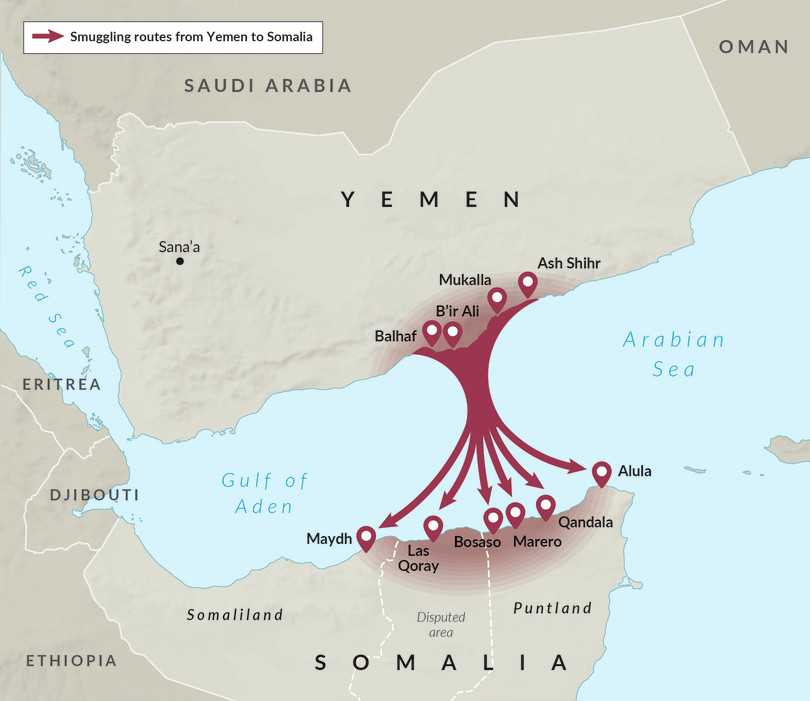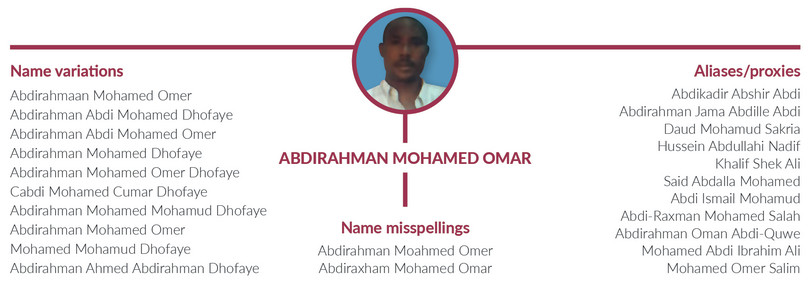Following the money underpinning the Yemen-Somalia arms trade
This is an excerpt from a forthcoming GI-TOC publication that examines the role of the hawala remittance system in the Yemen-Somalia arms trade, ‘Following the money’.
The ubiquity of small arms and light weapons in Yemen, as well as centuries-old cultural and commercial ties with Somalia, has made Yemen the primary source for illicit arms among Somali importers. Consignments of small arms and ammunition from Yemen cross the Gulf of Aden in a matter of hours to the northern coast of Puntland, a semi-autonomous region in northern Somalia. The port city of Bosaso, Puntland’s largest city and commercial capital, is the financial epicentre of the illicit trade. The influx of arms from Yemen fuels the ongoing civil conflict in Somalia, and some weapons are believed to be transported on throughout the broader East African region.1
The hawala system, a semi-informal mechanism of international money transfer, underpins the financing of the arms trade. This study focuses on the use of four Somali hawala money-transfer operators (MTOs) by six prominent arms dealers and middlemen based in Yemen and Somalia. GI-TOC analyzed data – provided by an independent third-party researcher – from 176 arms-related remittance transactions totalling US$3.7 million and dating between 2014 and 2020. These transactions were conducted through the four primary MTOs operating in Puntland: Amal Express, Dahabshiil, Iftin Express and Taaj.
These arms dealers and middlemen all exploited gaps among MTOs in basic anti-money laundering/countering the financing of terrorism (AML/CFT) controls, including the principle of ‘know your customer’, to facilitate arms deals between Yemen and Somalia. Arms traffickers routinely used dozens of aliases, names and spelling variations. Additionally, the use of proxy agents by arms dealers to conduct transactions on their behalf appeared to be common.
For their part, MTOs serving Somalia face significant challenges in implementing effective AML/CFT measures. Somalia has recently entered its fourth decade of civil war and is routinely categorized as a ‘failed state’. Government institutions are extremely underdeveloped, human capital is limited and the Islamist militant group al-Shabaab controls vast swathes of the country. While the current study does not attribute any specific wrongdoing to the MTOs serving Somalia and Yemen, it is clear that the remittance system in Somalia and Yemen requires significant reform in order to prevent its abuse by criminal actors.

Figure 7 Arms smuggling routes from Yemen to Somalia.
SOURCE: GI-TOC.
What is the hawala system?
There is no universal definition of what constitutes a hawala money-transfer service. hawala (Arabic for ‘trade’ or sometimes ‘trust’) can refer to many kinds of informal or semi-informal money-transfer systems.2 Customers use brokers based in their respective locations to send and receive money, paying a small commission and sometimes using a password to release the money.3 Traditional hawala networks are based entirely on trust and the honour system, meaning they can function in areas that lack a functioning banking system.4 The hawala system also offers a number of other advantages. These include the system’s competitive pricing, faster money transmission and suitability to specific cultural contexts, as well as the transfer or concealment of criminal proceeds and evasion of currency controls, sanctions and taxes.5
While such ‘pure’ hawala operations still exist, most MTOs serving Somalia are now closely affiliated or have partnered with the growing Somali domestic banking sector, as well as with Gulf-based financial institutions.6 Nonetheless, the majority of remittance companies serving Somalia are still excluded from access to the international banking system. To transfer remittances from Europe, for instance, most Somali MTOs use private security companies – such as Brink’s and G4S – to collect cash from their agents and physically transport it to Dubai, which effectively functions as a financial clearing house for remittance companies transacting business in Somalia.
Abdirahman Mohamed Omar (aka ‘Dhofaye’)
Abdirahman Mohamed Omar, also known as ‘Dhofaye’, is arguably the most active illicit-arms importer in Puntland. Of the 176 arms-related remittance transactions analyzed by the GI-TOC, 98 were executed by Dhofaye between October 2016 and April 2020. The value of these 98 transactions totalled more than US$2.1 million, or approximately 57 per cent of the total financial flows examined by the GI-TOC.
According to United Nations sanctions monitors, Dhofaye was one of two individuals identified by Puntland security forces aboard a skiff that was transporting a consignment of arms when it was interdicted by Puntland authorities in September 2017.7 In April of the same year, Dhofaye allegedly facilitated a shipment of weapons to the Islamic State faction based in north-eastern Puntland.8 Information provided to the GI-TOC by Puntland-based security sources, as well as analysis of phone and financial records, strongly indicates that Dhofaye remains active in the illicit arms trade at the time of writing.
Exploiting MTO compliance gaps
MTOs operating in Somalia routinely maintain that they are compliant with national AML/CFT regulations.9 One senior MTO executive told the GI-TOC that if his company did not have a proper know your customer system in place, it would no longer be in business.10 ‘We know all our customers and we have a system of verifying each and every one of them’, he wrote.11
The 176 arms-related transactions analyzed by the GI-TOC suggest a different conclusion. For the six arms importers and suppliers highlighted in its study, the GI-TOC found dozens of name variants, spelling variations and spelling errors across transactions conducted through the four MTOs. In numerous instances, the GI-TOC found the names of entirely different individuals listed on remittances transacted under the mobile-phone numbers of known arms dealers. For instance, Dhofaye’s identity was rendered in 24 distinct ways – including nine entirely dissimilar names – across the 98 transactions associated with him. The GI-TOC also identified five distinct mobile-phone numbers affiliated with transactions conducted by Dhofaye.
According to representatives of MTOs interviewed by the GI-TOC, it is company policy to require clients to physically present themselves at the branch in order to remit funds.12 However, the GI-TOC cross-referenced the 98 transactions attributed to Dhofaye with tower location data for the primary mobile-phone number affiliated to Dhofaye. The analysis revealed that Dhofaye was not physically present in Bosaso on at least 29 occasions on the dates of the transfers. In most of these instances, he was not within hundreds of kilometres of the city. Whether Dhofaye had sent proxies to transact the remittances on his behalf or whether he had provided instructions to the MTO agents remotely was not possible for the GI-TOC to determine.

Figure 8 Abdirahman Mohamed Omar’s name variations and aliases used for cash transfers.
SOURCE: GI-TOC.
Reforming the hawala system
The hawala remittance system underpins the financing of the Yemen–Somalia arms trade, an illicit economy that has grave security ramifications not only for Somalia but also for the broader East Africa region. The hawala system is also abused by other criminal networks and terrorist organizations operating in the region. Yet in seeking to address these problems, one must not lose sight of the fact that hawala remittances, on the whole, do far more good than harm. The continued presence of remittance systems in both Yemen and Somalia is a humanitarian necessity,13 and is critical to the functioning of their respective national economies. Any effort to address the behaviour of hawala operators must therefore focus on reforming the system, not destroying it. Towards this end, the forthcoming long-form version of this study will propose a series of recommendations aimed at addressing compliance gaps among remittance operators serving Somalia and Yemen.
Notes
-
Michael Horton, Arms from Yemen will fuel conflict in the Horn of Africa, Terrorism Monitor, 18, 8, 17 April 2020, https://jamestown.org/program/arms-from-yemen-will-fuel-conflict-in-the-horn-of-africa/. ↩
-
Roger Dean, Remittances to Syria: what works, where and how, Norwegian Refugee Council, July 2015, https://reliefweb.int/sites/reliefweb.int/files/resources/2015-07-nrc—remittances-to-syria—report-final-%281%29.pdf. ↩
-
John Bryant, Remittances in humanitarian crises, Overseas Development Institute, March 2019, https://www.odi.org/sites/odi.org.uk/files/resource-documents/12638.pdf. ↩
-
Ibid. ↩
-
Financial Action Task Force (FATF), The role of hawala and other similar service providers in money laundering and terrorist financing, October 2013, https://www.fatf-gafi.org/documents/documents/role-hawalas-in-ml-tf.html. ↩
-
Global Initiative Against Transnational Organized Crime, Civil Society Observatory of Illicit Economies in Eastern and Southern Africa Risk Bulletin, Issue 10, July–August 2020, https://globalinitiative.net/wp-content/uploads/2020/08/Civil-Society-Observatory-of-Illicit-Economies-in-Eastern-and-Southern-Africa-Risk-Bulletin-10.pdf. ↩
-
United Nations Monitoring Group on Somalia and Eritrea, Somalia report of the Monitoring Group on Somalia and Eritrea submitted in accordance with resolution 2317 (2016), 8 November 2017, https://www.undocs.org/S/2017/924. ↩
-
Ibid. ↩
-
The complete AML/CFT compliance policies for the four MTOs discussed in this study are available through the following: Amal Express, Compliance, http://www.iftinuk.com/Compliance.php; Dahabshiil, Anti-money laundering, https://www.dahabshiil.com/anti-money-laundering; Iftin Express, Compliance, http://www.iftinuk.com/Compliance.php; Taaj, Money laundering controls, https://taajmoneytransfer.co.ke/money-laundering-controls/ (websites last accessed on 10 July 2020). ↩
-
Statement from a senior Somali MTO executive, 30 June 2020. ↩
-
Ibid. ↩
-
Interview with Abdulkadir Osman, senior accountant at Amal Express, 11 July 2020, by phone; with a representative of Taaj, 8 August 2020, by phone; and a written submission from Dahabshiil, 10 August 2020. ↩
-
Sherine El Taraboulsi-McCarthy, The challenge of informality: Counter-terrorism, bank de-risking and financial access for humanitarian organisations in Somalia, Overseas Development Institute, June 2018, https://www.odi.org/sites/odi.org.uk/files/resource-documents/12258.pdf. ↩
